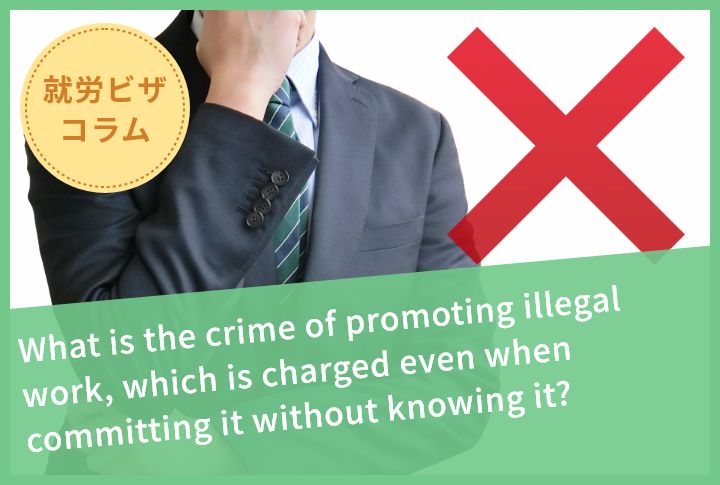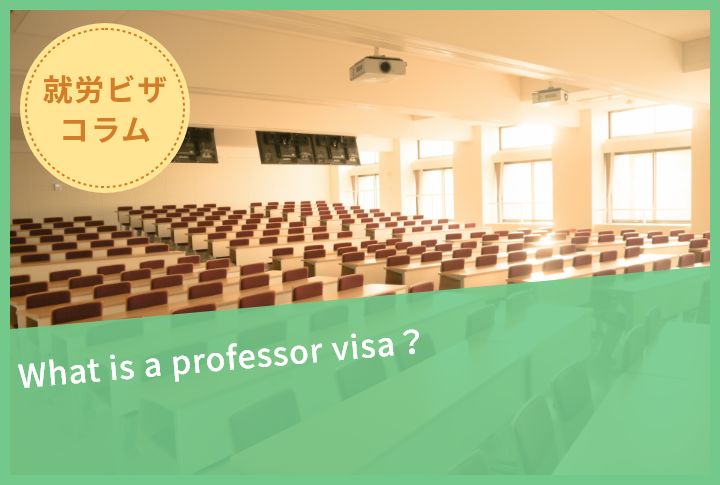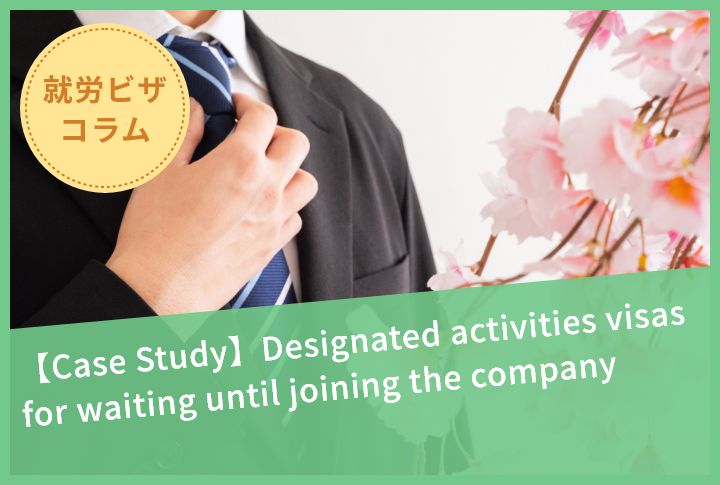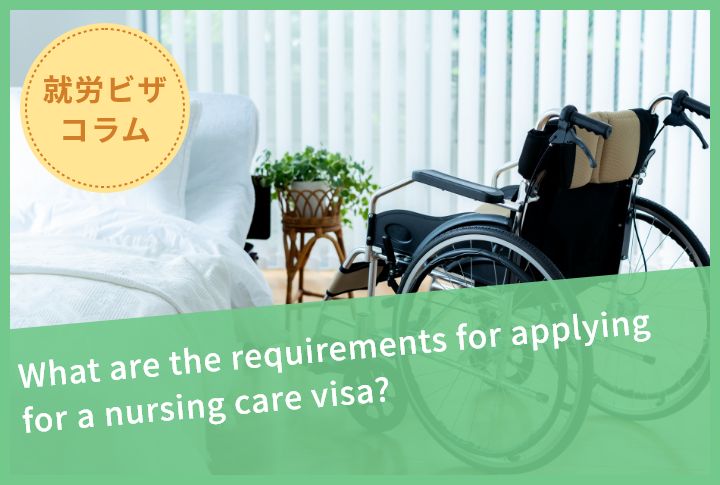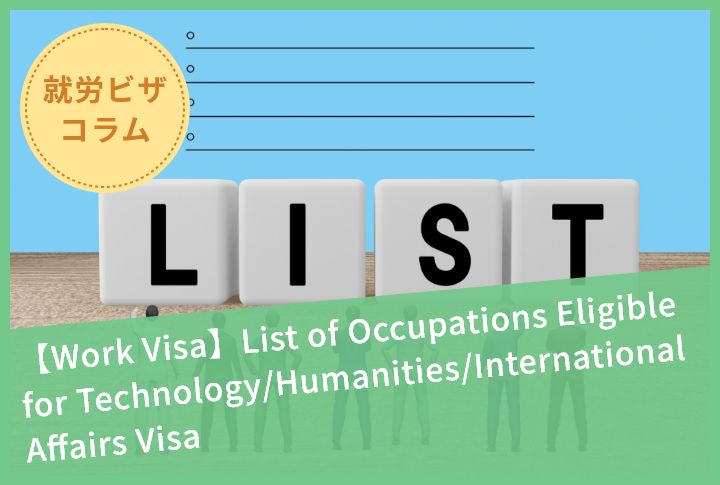Thorough verification of permitted/rejected cases of work visas!
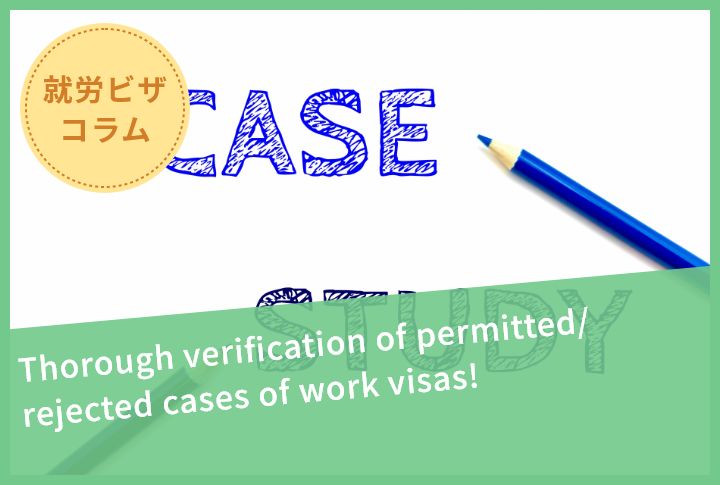
In this article, we will analyze “engineer/specialist in humanities/international services visa,” which is a typical work visa, based on 2 guidelines published by the Ministry of Justice: “Clarification, etc. of status of residence of ‘Engineer/Specialist in Humanities/International Services’” and “Guidelines for permission to change the status of residence of students to ‘Engineer/Specialist in Humanities/International Services.’”
Regarding the rejected cases introduced later, we put comments of an international administrative scriveners, so please make use of them.
Index
1. Requirements for permission for work visas
In order to be granted a work visa, it is necessary to have the eligibility for status of residence and the conformity with standards of permission for landing.
What are the specific requirements for the eligibility for status of residence and the conformity with standards of permission for landing?
The statuses of residence (so-called visas) in Japan are categorized by activity contents, personal statuses, and positions. If a foreigner is to engage in activities falling under such categories listed in the Immigration Act, such activities are considered to be eligible for the relevant status of residence, and if a foreigner is to engage in activities that do not fall under such categories, such activities are not eligible for statuses of residence.
In other words, you cannot obtain a work visa to engage in any activity that is not set forth in the Immigration Act.
Next, we will explain the conformity with standards of permission for landing. The criteria for landing permission are set forth in the Ministry of Justice Ordinance in addition to the eligibility for status of residence. The criteria are set forth only for activities which need adjustment in light of immigration policy, due to their impact on the economy and people’s lives,. In the case of a work visa, educational background, work history, qualifications, etc. are required.
If applicants meet the criteria, they are considered to have the conformity to the criteria for landing permission, and if they don’t meet the criteria, they cannot obtain work visas as they are considered not to have conformity to the criteria for landing permission.
Like this, the eligibility of the status of residence and the conformity with the standards of permission for landing are necessary to obtain a work visa.
2. Actual cases of permission for a work visa
In this section, we will list up cases where work visas were granted, based on 2 guidelines published by the Ministry of Justice: “Clarification, etc. of status of residence of ‘Engineer/Specialist in Humanities/International Services’” and “Guidelines for permission to change the status of residence of students to ‘Engineer/Specialist in Humanities/International Services.’”
(1) Permitted cases of work visas when the highest academic background is a university
(a) A person who has graduated from the Faculty of Engineering engages in technology development service based on a contract with a company which manufactures electrical products.
(b) A person who has graduated from the Faculty of Business Administration engages in translation/interpretation-related work based on a contract with a company which provides computer-related services.
(c) A person who has graduated from the Faculty of Law engages in legal assistance work based on a contract with a law firm.
(d) A person who has graduated from the Faculty of Education engages in work as an English instructor based on a contract with a company which provides language instruction services.
(e) A person, after graduating from a university, majoring in engineering, and working for a software company in the home country, engages in computer-related services as a software engineer and receives about 350,000 yen per month as salary, based on a contract with a software company in Japan.
(f) A person, after graduating from a university, majoring in economics and international affairs in the home country, engages in marketing support services between the home country and Japan (more specifically, services related to research on market, users, and automobile import trends, and automobile sales management, supply and demand management, strengthening cooperation with local dealers, etc.) and receives about 200,000 yen per month as salary, based on a contract with a Japanese automobile manufacturer.
(g) A person, after graduating from a Japanese university majoring in business administration, engages in emergency response and security services as an international flight attendant, as well as interpretation, guidance, etc. in the person’s native language, English, and Japanese to passengers, and teaching languages, etc. in employee training and receives about 250,000 yen per month as salary, based on a contract with a Japanese airline company.
(2) Permitted cases of work visas when the highest academic background is a vocational school
(a) A person who have taken courses of game theory, CG, programming, etc. in the manga/animation department engages in the game development service, based on a contract with a Japanese company which provides computer-related services.
(b) A person who has graduated from the automobile maintenance department engages in services of inspection, maintenance, and disassembling of the core parts of automobiles, such as engines and brakes etc., as a service engineer as well as other services as an automobile inspector, based on a contract with a Japanese company which provides services of inspection, maintenance, delivery, and storage of automobiles.
(c) A person who has graduated from the cosmetology department engages in product development and marketing services related to beauty products through activities as a beauty advisor at a cosmetics sales company.
(d) A person who has taken courses of tourism introduction, hotel seminar, training concerning food and drink, food service theory, retail marketing, bookkeeping, business etiquette, etc. in the department of international business engages in hiring and educating part-timers and preparing materials for new employees in the business development office of the headquarter of a restaurant management company.
(e) A person who has taken courses of tourism geography, travel business, sales marketing, presentation, hospitality theory, etc. in the tourism/leisure service department was employed as general staff at a large-scale resort hotel. In the application, it was stated that the person would be in charge of services at front desk, restaurant, guest room, etc. in accordance with the work shift, so the person was requested to explain the details of such services. According to the explanation, some of the work did not fall under the activities permitted by the status of residence of “Engineer/Specialist in Humanities/International Services” (e.g. serving customers at restaurants and handling orders regarding guest room equipment). However, the applicant was hired as a general staff, and the main work was translation/interpretation at the front desk, reservation management, concierge service in the lobby, customer satisfaction analysis, etc., and it turned out that these services were the same as services conducted by Japanese employees hired as general staff.
3. Actual cases of non-permission of work visas
In this section, we will introduce some of the cases where a work visa was not granted which are described in “Guidelines for permission to change the status of residence of students to ‘Engineer/Specialist in Humanities/International Services.’”
* below are written by our administrative scriveners.
(1) Rejected cases of work visas when the highest academic background is a university
(a) A person who graduated from the Faculty of Economics applied for a visa to engage in accounting services based on a contract with an accounting firm. However, since there was only a restaurant instead of an office at the alleged location, the person was requested to explain the situation. Because the person did not give a clear explanation, it was found that the office did not actually exist and that the person was not conducting activities of “Engineer/Specialist in Humanities/International Services.” As a result, the person was not granted the status of residence.
In the examination regarding work visas, the eligibility of the status of residence (activity contents) is put importance, so if you work at a company that does not actually exist, of course, a work visa will not be given. Even if you are granted a work visa as your lies were not revealed, you will be penalized big time later, so please do not make a false application.
(Reference)
In order to control false application, the “crime of illegal acquisition of status of residence, etc.” was established on January 1, 2017.
If a person receives a work visa through deceit or other wrongful means, the person will be punished by imprisonment with or without work for no more than 3 years or a fine of no more than 3 million yen, or by combination thereof. (Article 70, paragraph 1, item (ii)-2 of the Immigration Act).
(b) A person who graduated from the Faculty of Education applied for a visa to engage in the lunch box packing service at a lunch box processing factory as a field worker, based on a contract with a company that manufactures and sells lunch boxes, but it was recognized that such service did not require any knowledge belonging to the field of humanities and there was no eligibility for the status of residence. As a result, the person was not granted the status of residence of “Engineer/Specialist in Humanities/International Services.”
In the judgement of this case, it was found that there was no eligibility for the status of residence of “Engineer/Specialist in Humanities/International Services.” In order to obtain a work visa, the work to be conducted must require academic knowledge. Also, the way of thinking and sensibilities as a foreigner must be utilized in the course of work., while the lunch box packing service at a lunch box processing factory is considered as a so-called simple work.
To obtain a “Engineer/Specialist in Humanities/International Services” visa, it is essential to check the business content because the eligibility for the status of residence will not be recognized if the work is something that can be learned through repeated and continuous practice or is something that does not require knowledge or skills.
(c) A person who graduated from the Faculty of Engineering applied for a visa to engage in the engineering service with salary of 135,000 yen per month based on a contract with a company which provides computer-related services. Since it was found that the monthly remuneration of Japanese graduates who were hired at the same time to engage in the same type of work was 180,000 yen per month, the person’s remuneration was not recognized as equivalent to or higher than that of Japanese people. As a result, the person was not granted a visa.
“The applicant must receive no less reward than a Japanese national would receive for comparable work” under the Ministerial Ordinance on Criteria for Landing Permission concerning the status of residence of “Engineer/Specialist in Humanities/International Services.” In this case, the salary for new Japanese graduates was 180,000 yen per month, but that for the foreign applicant was 135,000 yen per month. Accordingly, the foreign applicant was not granted a visa as the remuneration requirement was not satisfied.
This remuneration requirement is generally determined by comparing with Japanese people of the same company as in this case, but it may be judged by comparing to wages of other companies in the same industry. Therefore, you may need to check the amounts of wages of other companies in the same industry in addition to the wages of your company in order to make comparison.
(d) A person who graduated from the Faculty of Commerce applied for a visa to engage in the overseas transaction service based on a contract with a company conducting trading/overseas business, but it was found that the applicant was working part-time for more than 200 hours per month continuously for 1 year while staying in Japan with the status of residence of “Student.” Since he was working far beyond the permitted hours, it was found that his situation of residence in Japan had not been satisfactory. As a result, the applicant was not granted the status of residence.
When applying for the change from a student visa to a work visa, good behavior is one of the requirements. For example, if you have caused a case of shoplifting or injury, such fact may have negative influence on the judgement regarding your work visa. In addition, international students can only work within certain hours, but if they work more than permitted hours, not complying with the provisions of the Immigration Act which specify such rules, such fact will be considered negatively in the immigration examination.
(2) Rejected cases of work visas when the highest academic background is a vocational school
(a) A person whose attendance rate at a vocational school was 70% was asked to provide a reason for such low attendance rate. The person explained that it was due to illness, but it was found that the person had been engaged in activities other than that permitted under the status of residence previously granted while being absent from the school. As a result, the person was not granted a visa.
As mentioned in (4) above, when applying for the change from a student visa to a work visa, the behavior during school years in Japan will be subject to examination. In the above case, the foreigner was absent from a vocational school due to illness while working part-time.
International students work part-time to maintain their daily lives, but they are not allowed to work part-time if they are not engaged in their original activities as international students.
Therefore, if you are on leave of absence or have withdrawn from school, you cannot work part-time even if your period of stay remains, so please be aware of that.
(b) A person was hired at a hotel as a front desk staff to engage in the reservation management and interpretation services. In the application, it was stated that for the first year the person would serve at restaurants and clean guest rooms as a part of training. However, it turned out that foreigners previously hired at the hotel for the same purposes had continued to engage in activities not falling under activities of the status of residence, such as meal serving operations at restaurants and room cleaning, exceeding the initial training schedule. As a result, the person was not granted a visa.
According to “Clarification of status of residence when foreigners work at hotels, inns, etc.” announced by the Ministry of Justice in December 2015, even if a foreigner temporarily engages in activities that are not eligible for status of residence, it does not immediately become an issue and the eligibility of activities shall be judged from the whole activities performed during the period of stay.
Having said that, as in this case, if a foreigner is to constantly engages in services that are not permitted by the work visa under the pretext of training, the foreigner may not be granted the work visa.
Please note that training for new employees cannot be given to a foreigner if it is conducted for the purpose of making the foreigner to engage in the work that is not permitted by the work visa.
(c) A person who graduated from the voice actor department applied for a visa to engage in the translation/interpretation services as a lobby staff based on a contract with a hotel in Japan which has many foreign customers, but it was found that there was no relevancy between the service and the majored course, and so, the person was not granted a visa.
In order for international students who have graduated from a vocational school to be granted a work visa, they are required to have majored in courses related to the work they are going to engage in by the Ministerial Ordinance on Criteria for Landing Permission. In addition, if the highest academic background is a vocational school, experience for 3 years or more is required to engage in translation/interpretation work.
In the above case, an international student who has graduated from the voice actor department was going to work as a hotel lobby staff, but no relationship was found between the work and the person’s major at a vocational school. In addition, judging from the fact the person was not granted a visa, the person’s highest academic background is probably a vocational school and the person had no work experience in translation/interpretation for 3 years or more.
(d) A person who had taken the course of Japanese-English practical interpretation at a translation/interpretation vocational school applied for a visa to engage in translation/interpretation services, but the place of operation was a restaurant, and the details of the interpretation service was to take orders in English. Thus, the interpretation service was rather simple and it was only a part of serving customers, while the target of translation service was only menus, so the amount of interpretation/translation work was not sufficient. As a result, the person was not granted a visa.
In order to obtain a work visa, the credibility of the application contents will be checked. For example, if you will have a job that is not feasible or a job that includes unnecessary services although the amount of work is sufficient, you may not be granted a visa because there is no credibility of the application contents.
In this case, the activity was menu translation, but normally workload for that is not expected to be so much to require working on a full-time basis.
Accordingly, when starting a new business, it is necessary to indicate a solid plan and clarify the necessity of the service to be provided.
4. What happens if I’m not granted a work visa?
When we are requested to handle rejected cases, we start by considering the possibility of obtaining a visa by reapplication. We verify the possibility to receive a visa based on the requirements for work visas.
There are 3 verification methods: (1) interviewing the client, (2) verification of submitted materials, and (3) confirmation of immigration evaluation (by asking the immigration authority the reasons for rejection).
Even if your work visa is unfortunately rejected, there may be a chance for permission, depending on the case, so please contact us if you have any problems.
5. Summary
How was this article, “Thorough verification of permitted/rejected cases of work visas!”?
Work visas can be obtained if the requirements are met.
Therefore, we believe that “unexpected” rejection can be prevented.
Instead of applying for work visas, being unsure whether permission will be granted, we are particular about how to obtain a work visa safely and with certainty in our daily work.
For that, we try to choose visas that can be obtained through simple procedures rather than trying for difficult and complicated application.
If you have any problems with your work visa, please feel free to contact us.








